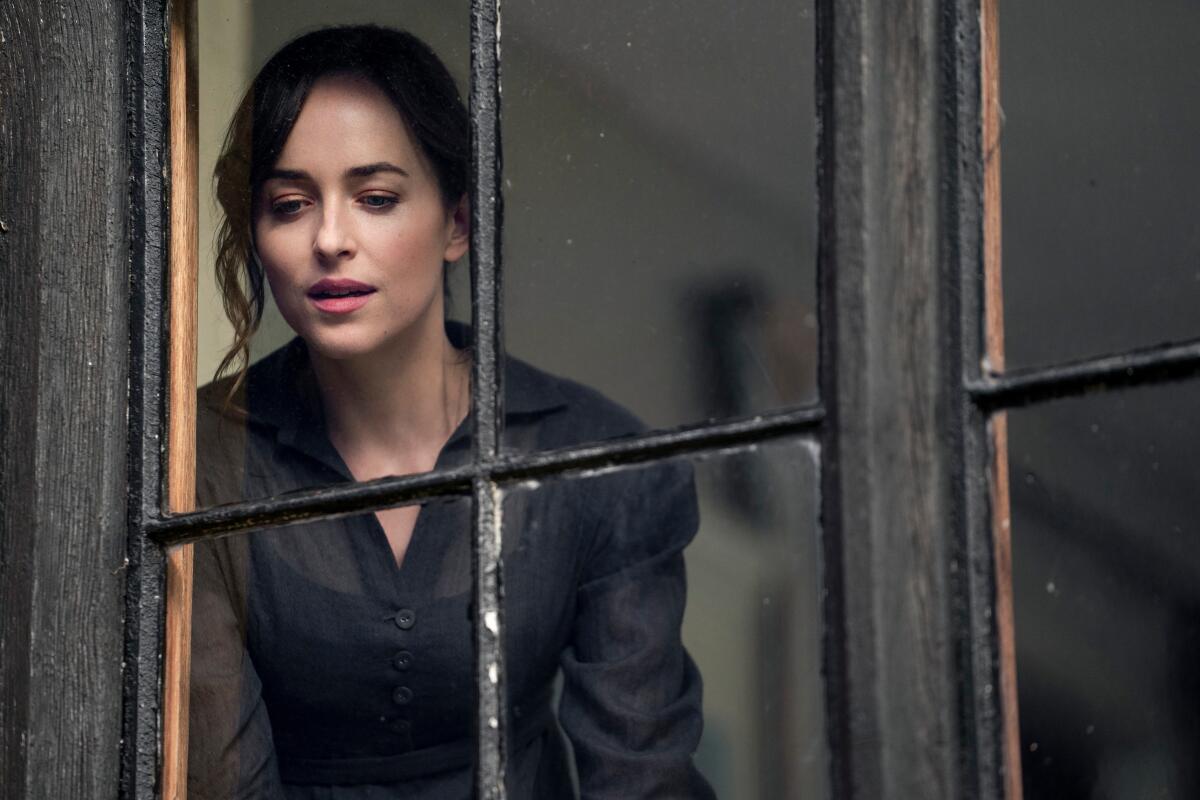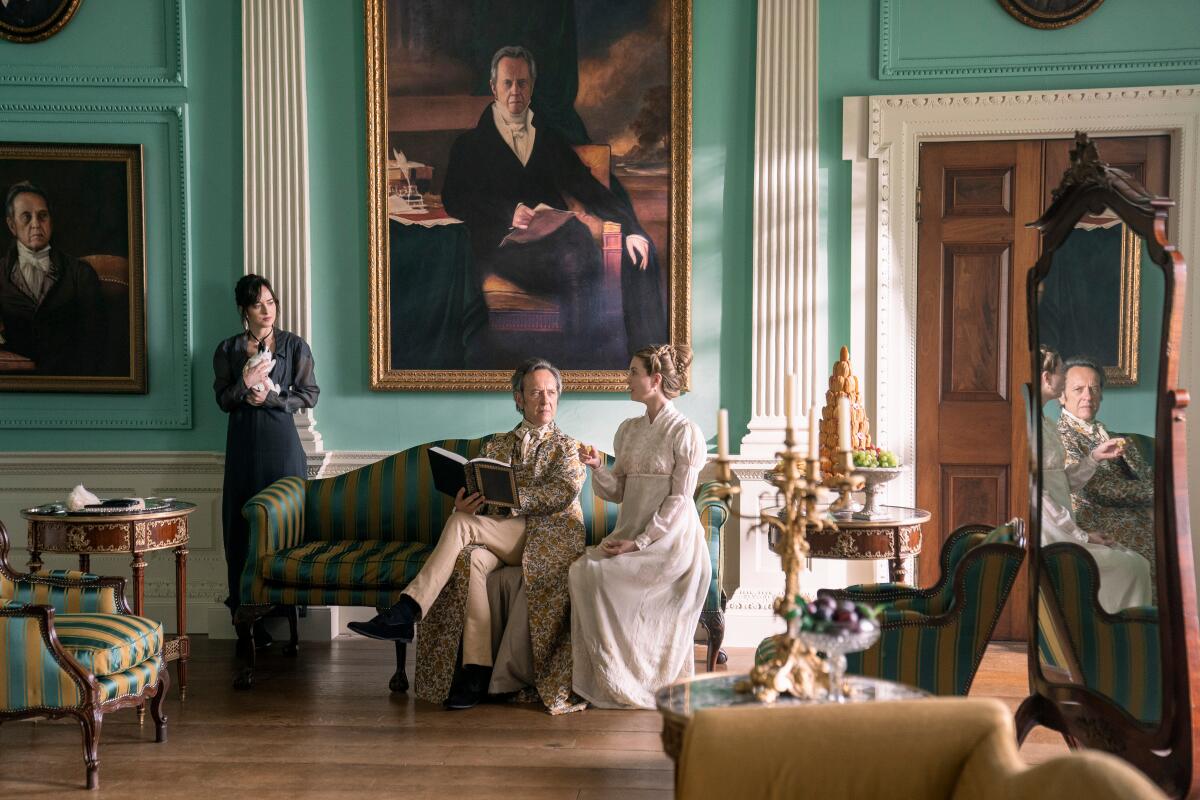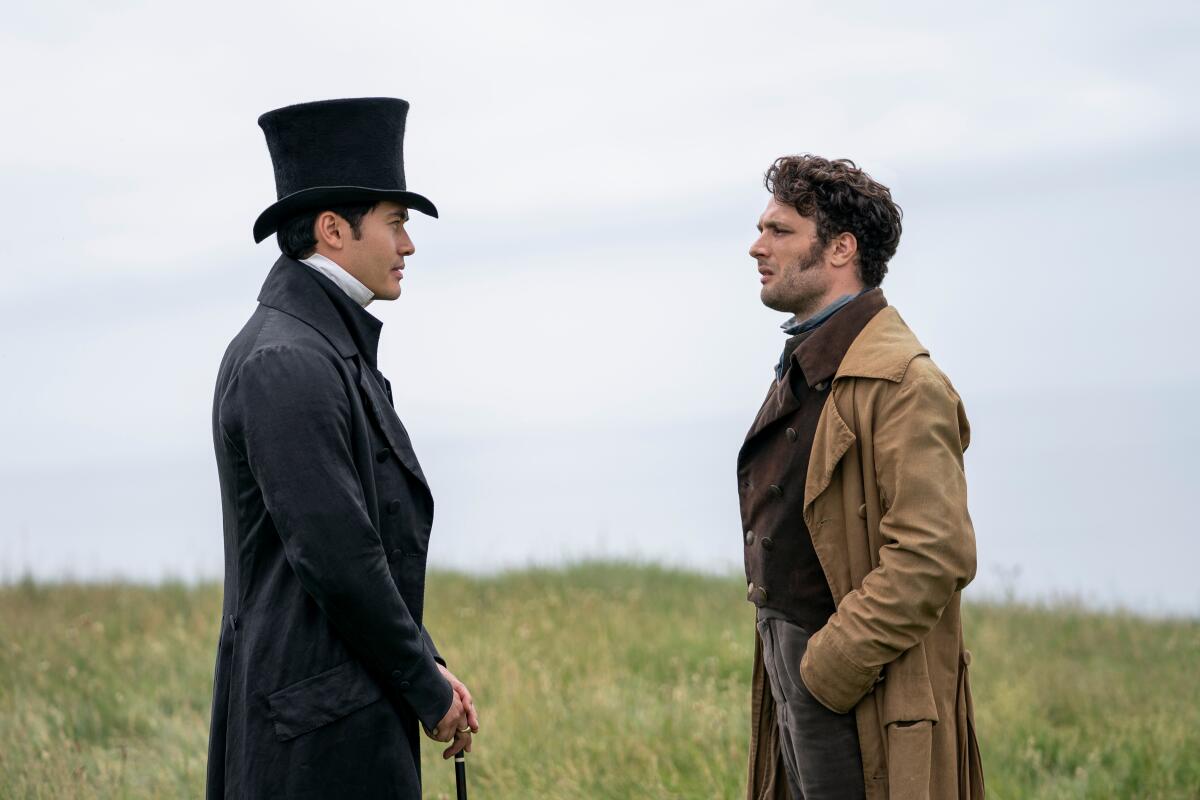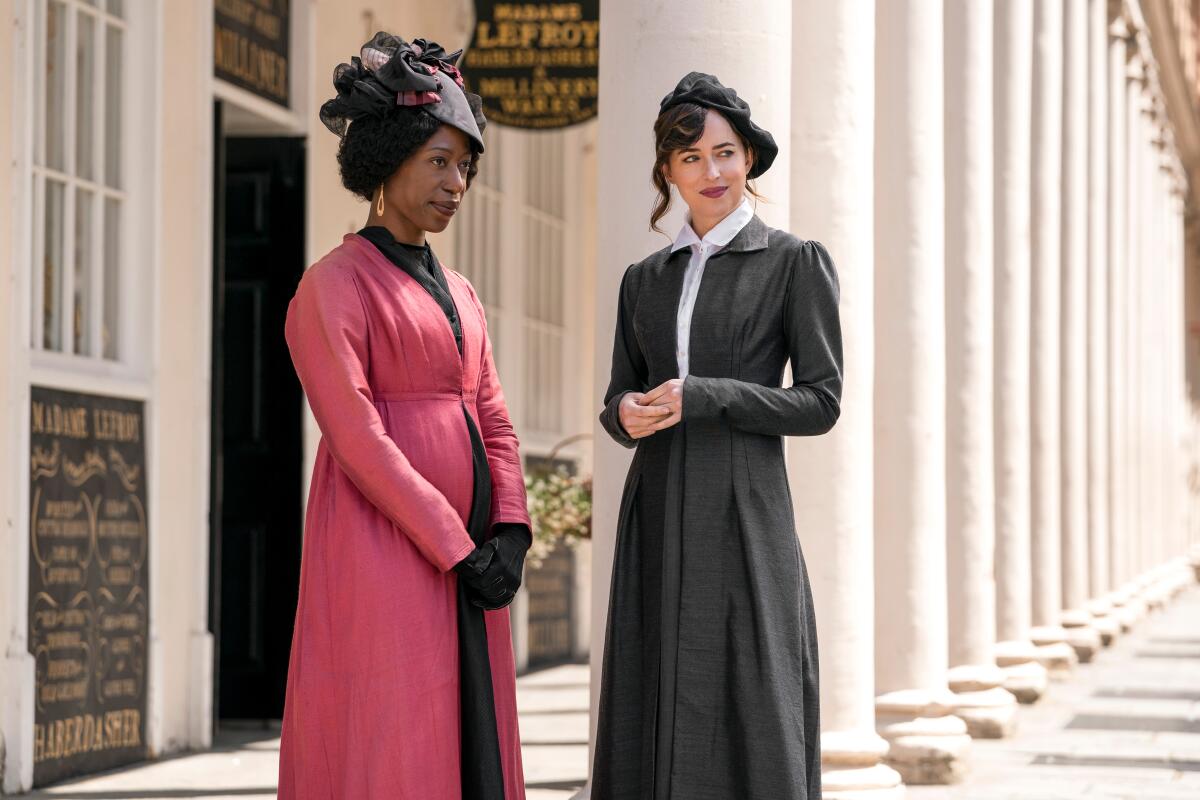Review: Netflix’s Jane Austen adaptation ‘Persuasion’ is a dreadful film, never to be borne

To begin with a perhaps quintessentially Jane Austen question: Which of these two do you prefer?
Sample A: “There could have never been two hearts so open, no tastes so similar, no feelings so in unison, no countenances so beloved. Now they were as strangers; nay, worse than strangers, for they could never become acquainted. It was a perpetual estrangement.”
Sample B: “A heartbeat ago, there were no two people more in rhythm than Wentworth and I. Now we’re strangers. Worse than strangers — we’re exes.”
For your safety
The Times is committed to reviewing theatrical film releases during the COVID-19 pandemic. Because moviegoing carries risks during this time, we remind readers to follow health and safety guidelines as outlined by the CDC and local health officials.
Tricky, I know. Let’s try another:
Sample A: “The worst of Bath was the number of its plain women. He did not mean to say that there were no pretty women, but the number of the plain was out of all proportion.”
Sample B: “It’s often said that if you’re a five in London, you’re a 10 in Bath.”
Oof. Last one, I promise.
Sample A: “My being the mother is the very reason why my feelings should not be tried. I am not at all equal to it. You saw how hysterical I was yesterday.”
Sample B: “The thing about me is, I am an empath.”

To clarify the obvious — something the movie under review today has no problem doing — the “A” excerpts are from Jane Austen’s magnificent novel “Persuasion.” The “B” excerpts are from the movie, which I suppose you could also call “Persuasion,” insofar as it appears to have lifted sentences from the novel and fed them through some kind of Instagram-filtering, catchphrase-generating, text-summarizing idiot bot. Like even the lousiest Regency-era frippery, it has its intermittent pleasures, most of them visual. No movie that finds Dakota Johnson modeling high-waisted frocks against the Lyme Regis seawall or the lush Somersetshire countryside could be called a complete waste of time.
To be more charitable still: A movie in which Johnson falls on her face, upends a gravy boat over her head and climbs the stairs grumpily nursing a bottle of wine might be a source of some theoretical amusement. But she would have to be playing someone other than Anne Elliot, the oldest, wisest and scarcely most accident-prone of Austen heroines.
The director and writers of Netflix’s ‘Persuasion’ explain the updated language, inclusive casting choices and why Dakota Johnson talks to the camera.
Johnson, to be sure, projects a subtle intelligence and gravity more than worthy of this beloved literary character and her unusually bittersweet, ruminative love story. That’s why it’s dispiriting to see her Anne cast in the more generically sassy-klutzy mold of so many contemporary rom-com protagonists — some of whom, of course, already have some Austen spliced into their own cultural DNA.
Like Phoebe Waller-Bridge’s Fleabag, this Anne throws all manner of winks, smirks and droll asides at the camera, regularly demolishing the fourth wall (but happily leaving John Paul Kelly’s ornate, fondant-hued production design intact). And like Bridget Jones, this Anne delivers reams of cheekily self-effacing voice-over when she’s not drowning in self-pity. When Anne buries her face in a pillow and pines for Capt. Frederick Wentworth (Cosmo Jarvis), the handsome sailor whose proposal she rejected long ago at the insistence of her comprehensively stupid family, you half expect to hear a harpist’s rendition of “All by Myself.”

I wouldn’t object to such anachronism on principle — “All by Myself” is certainly easier on the ears than “The thing about me is, I am an empath” — and certainly not on purist grounds. One motion picture’s style must not be the rule of another’s, and some very fine ones, from this year’s delightful “Fire Island” to the immortal “Clueless,” have subjected Austen’s work to any number of cultural, temporal, geographical and vernacular liberties. Even those movies that remain in period garb have shown themselves capable of a disarming, distinctly modern comic energy, in particular Autumn de Wilde’s luscious “Emma” and Whit Stillman’s delirious “Love & Friendship,” possibly the finest Austen adaptation ever made and certainly the funniest.
And so the problem with this “Persuasion,” prettily but blandly directed by Carrie Cracknell from a script by Ron Bass and Alice Victoria Winslow, is not that it translates its source material into an easily digestible, Netflix-friendly comic idiom. It’s that said translation is so hopelessly at odds with what the movie thinks it’s giving us: a portrait of an endlessly perceptive, tolerant, dutiful and self-sacrificing woman, navigating her way back — through a familiar Austenesque maze of unsavory relations, pragmatic courtships and complicated inheritance schemes — to the love of her life.
There’s a sliver of promise in the idea of Johnson playing a slyer, snarkier Anne Elliot than usual, someone who remains unfailingly dependable and well mannered while quietly unloading on her pompous father, Sir Walter (Richard E. Grant); her peevish older sister, Elizabeth (Yolanda Kettle); and her chronically malingering younger sister, Mary (a sharp Mia McKenna-Bruce). But the barbs are strained and second-rate, and nothing about them suggests the workings of a particularly keen mind, let alone Anne’s famously generous spirit.

Cracknell and her collaborators seem less inspired than frustrated by the social strictures of 19th century Britain, and keen to inject them with their idea of a modern sensibility. This means that Anne and Capt. Wentworth, fatefully thrown back into the same social circle after eight years apart, cannot spend the length of a movie diligently avoiding any mention of their past romance. They must talk, they must spar and they must even DTR, God help us (or universe help us, to adopt this movie’s rigorously faith-neutral parlance).
Some of the supporting characters do benefit from this heightened emotional directness, and also from the more racially inclusive casting prominent in recent English period dramas from “Bridgerton” to “The Personal History of David Copperfield.” Nikki Amuka-Bird, who played a villain in that movie, embodies a warmer authority here as Anne’s (too) trusted confidant, Lady Russell. Nia Towle brings warmth and wit to the productively expanded role of Mary’s sister-in-law, Louisa Musgrove, whose friendship with Anne complicates her own attraction to Wentworth.
As Wentworth himself, Jarvis is as handsome as required, though nearly as drippy as he is scruffy. Fun as it is to watch Anne fiddle with his sextant, you almost prefer her scenes with her dreamy/scheme-y cousin, Mr. Elliot, who in this retelling is bracingly straightforward about his financial motives. He’s played by Henry Golding, whom I reckon we can call a 10 in a movie that rarely rises above a three. Golding deserves more roles, and not just of the “Crazy Rich” persuasion.
‘Persuasion’
Rating: PG, for some suggestive references
Running time: 1 hour, 50 minutes
Playing: Bay Theatre, Pacific Palisades; available for streaming July 15 on Netflix
More to Read
Only good movies
Get the Indie Focus newsletter, Mark Olsen's weekly guide to the world of cinema.
You may occasionally receive promotional content from the Los Angeles Times.












